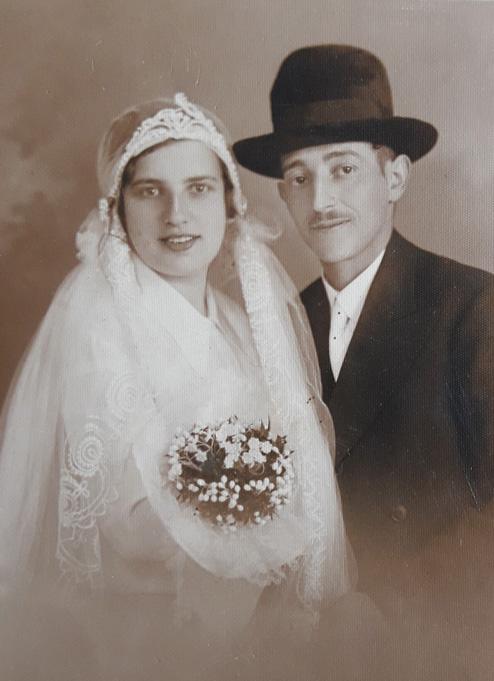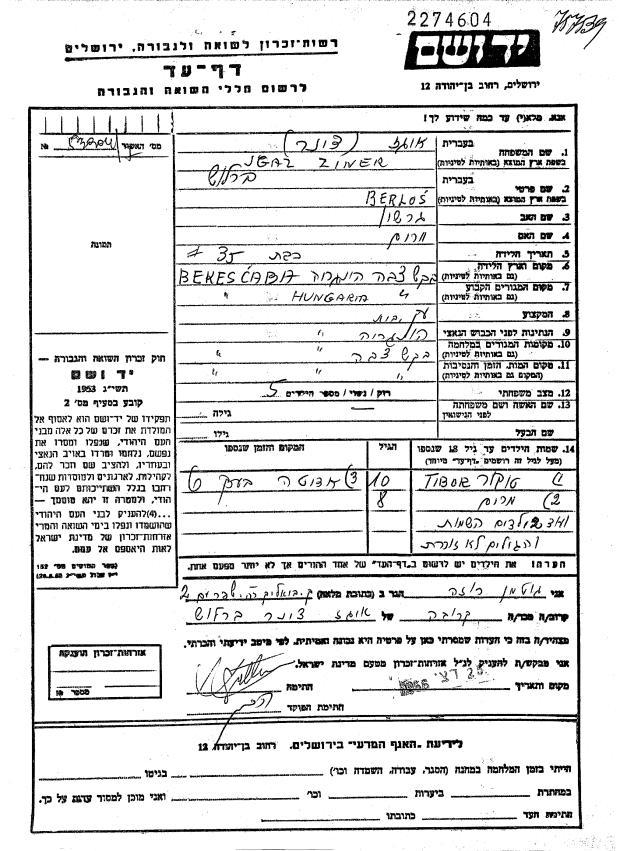
Yad Vashem



"Now my darling, we bid you farewell. I don't know if we will meet again in this life. Pray to the good Lord to be merciful with us, because we can't endure this situation for long…"
On 26 June 1944 - 75 years ago - Bracha Igaz and her five children were deported to Auschwitz, where they were murdered. She had written these parting words on a postcard only days earlier from the Békéscsaba ghetto in Hungary to her husband Yaakov.
Yaakov had been taken to the forced labor battalions of the Hungarian army in Debrecen, but he survived the war and later moved to Israel. The postcard was donated to Yad Vashem by Lea Ben-Tzvi, a great-niece of Bracha, along with a picture of Bracha next to the store in which she worked with her husband.
Bracha's story appears in Yad Vashem's new online exhibition "Love Her Like a Mother: Last Letters from the Holocaust: 1944," uploaded in advance of Israel's Holocaust Remembrance Day at the beginning of May 2019. The Israeli daily newspaper, Haaretz, wrote about the new exhibition, and that article was the catalyst for a meeting between Lea Ben-Tzvi and Mika Hasharoni, Yaakov's niece. The two both live in Israel but had never met before.
"Yona Kobo [Yad Vashem's Online Exhibitions Coordinator] made the connection between us. Mika read the Haaretz article and realized it was about her family. She got in touch with Yona, who put us in contact. We spoke on the phone then I drove to Tel Aviv to meet her. It was amazing to be able to talk about our joint family, and recall many stories from the past. She gave me a picture of Bracha and Yaakov from their wedding that I had never seen before. I passed it on to Yad Vashem, who added it to the exhibition," Lea explains.
Lea explained that Yaakov immigrated to Israel in 1956 after the revolution in Hungary. He lived with his sister, although Mika, his niece, was married and living in America at that time.
"I remember Yaakov as being very closed off and not speaking a lot. After losing his wife and five children it must have been very hard for him to continue," Lea recalls.
"We have almost no documentation of what happened to my father's family [Bracha'a nephew] during the Shoah. They were a very big family in Hungary, and almost all of them were murdered. My grandfather was killed but my father survived and moved to Israel in 1948.
"The postcard Yaakov brought with him to Israel was the only documentation from my family during the war. It was in my house for a long time before I passed it on to Yad Vashem. We couldn't keep it anymore because it needed to preserved in proper conditions. I want to thank Yad Vashem for their hard work and for promoting my family's story. It has made the whole family very excited, and given us something very real to pass onto the next generation."
The postcard will join thousands of other Holocaust-era documents, artifacts and artworks to be stored in the new Shoah Heritage Collections Center, which will be built at Yad Vashem in the coming years. The state-of-the-art Center is part of a new Shoah Heritage Center, which will house and display the vast Collections Yad Vashem has amassed over the years.
Yad Vashem's Online Exhibitions Coordinator Yona Kobo:
"This exhibit – the fourth in a series on last letters in which all the writers were murdered in the Holocaust – gives us a glimpse into the fate of Jews in the year 1944. These letters were written 75 years ago on small pieces of paper or the back of postcards, which sometimes are stained with the tears of either the senders of the recipients. Through the prism of these letters, we can tell the story of the individual in the Shoah, and restore the names and faces to the victims.
"My research and reconstruction of the lives and fates of these families – which are presented in the exhibit – was often very challenging due to the lack of available information. As we can see from this story, sometimes only after publishing do people come forward with more documents. I am delighted that the two sides of the family were able to reunite and send us more photographs and information about their loves ones, so we could add them into the exhibition."
To learn more about Bracha and the Igaz's family story as well as other stories of last letters written by victims of the Holocaust, please visit Yad Vashem's Last Letters online exhibitions 1941, 1942, 1943 and 1944.










